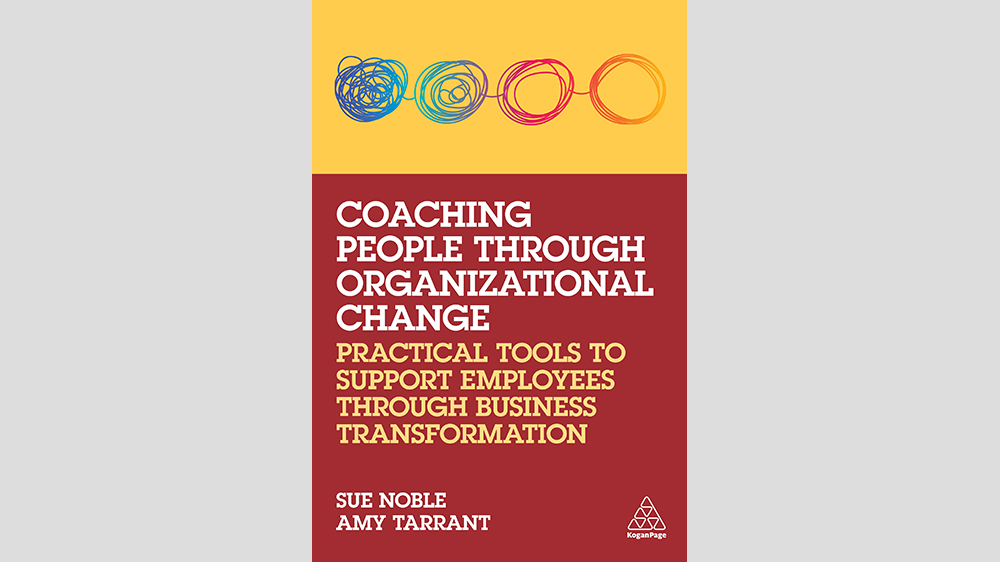
17 August 2023
We recently read Coaching People through Organisational Change, by Sue Noble and Amy Tarrant, in the EMCC UK Conversations with Authors series. Claire Caine, Lisa Read and Jasmine Miller write below with their thoughts and responses to the book.
Review by Claire Caine: ‘The chapters on resistance to change, and stakeholder management, were full of useful tips and models.’
The sub-title to this book is ‘practical tools to support employees through business transformation’, and that is exactly what it provides. The early chapters provide informative descriptions of the business landscape, with clear examples of the types of change currently facing the business world, including digitisation, regulation, and mergers and acquisitions.
It explains how coaching can be highly beneficial for change practitioners tasked with supporting stakeholders to adopt new ways of working. The book is packed with models and case studies that help you explore how best to use a coaching approach to support change initiatives. It also includes a very useful chapter on how to set up an internal coaching practice.
I greatly enjoyed all of this book. It reinforced a lot of what I already know, and it was great to read that my own experiences are not unique! The chapters on resistance to change, and stakeholder management, were full of useful tips and models to help a coach or change practitioner to work with clients who are struggling to support change in the business context.
I have been an internal coach and I thought the chapter on how to develop an internal coaching capability was particularly insightful. I also learned some new tools, such as the Empowerment Dynamic (a more positive answer to the Drama Triangle) and the new psychometric tool, Emergenetics. The chapter, ‘Making change stick’ was particularly good at calling out the shortsightedness of organisations that fail to consider benefits as a key metric of project success. The authors encourage a continued focus on benefits and the adoption of the new ways of working to give the project the highest chance of success.
I highly recommend the book to project and change managers, or to coaches looking to learn more about the frameworks and structures used to manage change projects and programmes. The inclusion of lots of examples and case studies make it really easy to see how particular models or approaches could be used.
Review by Lisa Read: ‘I see this book as a ‘live document’ that I will dip into often.’
This book considers all of the factors that lead to organisational change, and how a coaching approach can support employees going through the change. Change is an inevitable part of any organisation and needs to be managed well. The book shares information about change itself and also practical coaching tools throughout, with clear examples of how to use them.
As an external coach, I read the book through that lens, and looked for tools I can use to support the socially-minded organisations I work with. I was also curious to see what might be helpful for the leaders I work with. I was pleased to find that many of the tools are ones I already use, which gave me confidence that I am on the right lines. I also discovered new tools, such as the Emerge coaching model, and the similarly named but different, Emergenetics framework, which piqued my interest.
This was a timely book for me, as I am working with organisations that are facing big changes. It has given me confidence that I am working effectively, as much of it was familiar to me. I enjoyed considering my approach to familiar models, theories and frameworks, and how the authors use them. I have also gained some new nuggets of wisdom and been able to challenge my own thinking and approach, which is always useful!
I see this book as a ‘live document’ that I will dip into often. I think it’s a ‘Bible’ of knowledge for organisations going through change, and I will also be recommending it to leaders I know.
Review by Jasmine Miller: ‘The book made me think about change processes I have been involved in throughout my career.’
In this book, the authors evaluate and analyse the challenges organisations face when implementing and embedding change. There are many offerings throughout this book on how coaching practices and techniques can increase the likelihood of a change initiative being a sustained success.
I liked the section on trust as a change enabler, and how authenticity is key to this. I have an interest in coaching and teacher agency, so I could see a lot of connections here.
I was curious about the internal communication approach and thinking around creating a multi-channel internal communication strategy. Thinking about a restructure process that I worked through with a wider leadership team and HR, I was reflecting on the change communication and how a focus on the ‘what’ can often overlook the ‘why’ the change is happening in the first place.
The book made me think a lot about change processes I have been involved in throughout my career. Employees always remember previous change, and 70% of change initiatives fail. This has the effect of making people sceptical and creates low expectations around the launch of new initiatives. Coaching can play a significant role in consultation with staff around the context of prior change.
As I read the book, I felt like I was constantly reflecting and thinking about experiences and scenarios. I enjoyed reading the section on delivering sustained change. I found myself once again thinking about educational systematic change and how this might be addressed with more of a focus through coaching. I think this is particularly pertinent when it comes to the fast-paced new initiatives in education.
EMCC UK members: Find our Conversations with Authors resources for this book